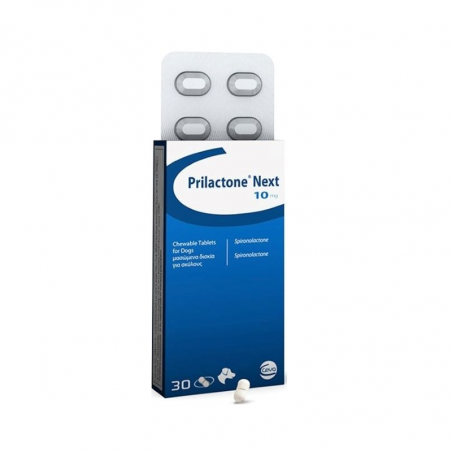Prilactone Next 10 mg 30 tablets
Treatment of heart failure caused by degenerative mitral valve disease in dogs.
For administration in combination with standard therapy (including diuretic support, if necessary) for the treatment of heart failure caused by degenerative mitral valve disease in dogs.
Active substance: Spironolactone
Spironolactone and its active metabolites (including 7α-thiomethyl-spironolactone and canrenone) act as specific aldosterone antagonists and exert their effects through competitive binding to the mineralocorticoid receptor located in the kidneys, heart and blood vessels. Spironolactone is a natriuretic (historically described as a weak diuretic). In the kidney, spironolactone inhibits sodium retention induced by aldosterone which leads to an increase in sodium content and subsequently to water excretion and potassium retention. The renal effects of spironolactone and its metabolites lead to a decrease in extracellular volume and, consequently, to a decrease in cardiac preload and left atrial pressure. The result is an improvement in cardiac function.
In the cardiovascular system, spironolactone prevents the harmful effects of aldosterone. Although the precise mechanism of action is not yet clearly defined, aldosterone promotes myocardial fibrosis, myocardial and vascular remodeling and endothelial dysfunction. In experimental models in dogs, long-term therapy with aldosterone antagonists has been shown to prevent progressive left ventricular dysfunction and attenuate left ventricular remodeling in dogs with chronic heart failure. When administered in conjunction with ACE inhibitors, spironolactone can counteract these aldosterone release effects.
A slight increase in blood aldosterone levels can be observed in the animals being treated. It is believed that this is due to the activation of feedback mechanisms, having no adverse clinical consequences. There may be hypertrophy of the adrenal glomerular zone, dose-dependent, with high doses.
Posology and route of administration:
Oral administration.
2 mg of spironolactone per kg of body weight once a day, that is, 1 tablet per 5 kg of body weight, orally. The veterinary medicinal product should be administered with a meal.
The tablets are flavored. If the dog does not accept the tablet given by hand or in the bowl, the tablets can also be mixed with a small amount of food before the main meal, or administered directly into the mouth after the meal.
Because it is a veterinary medicinal product subject to medical prescription, we request to send it to the email: [email protected].



